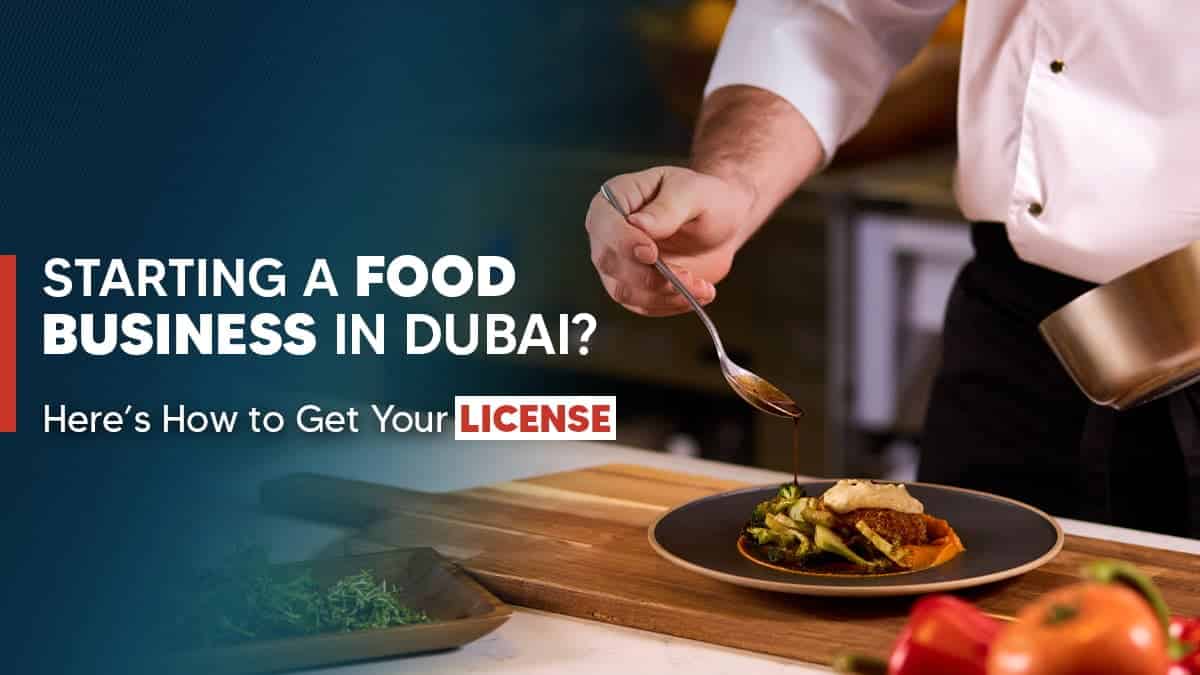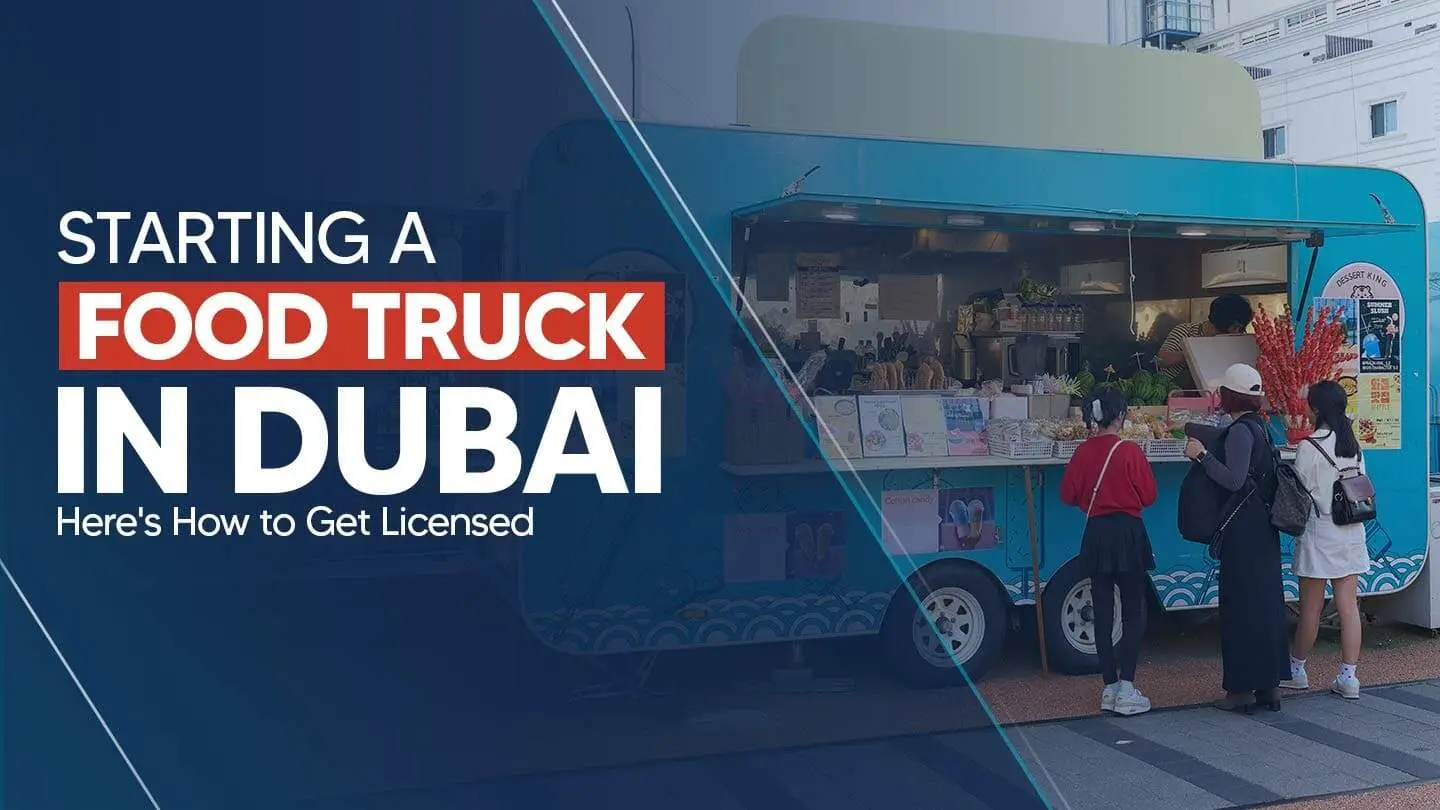If you plan to start a food business in Dubai, getting a food license is the first crucial step. Whether you’re launching a restaurant, café, or food truck, the right permit ensures your business meets Dubai’s health and safety regulations. Dubai’s food industry is booming and is projected to grow by 5.5% in the coming year.
In this blog, we’ll guide you through obtaining a food license in Dubai and the food license cost in Dubai, making sure that your food business starts on the right track.
What is a food trade license in Dubai?
A food trade license in Dubai is a legal permit required for businesses that import, export, distribute, and sell food products. Additionally, it ensures that the company complies with food safety regulations.
This license is issued by the Dubai Department of Economic Development (DED) in collaboration with Dubai Municipality.
Types of Food Business Opportunities in Dubai
Dubai offers an evolving environment for food business opportunities due to its diverse population, tourism, and growing economy. Here are some potential avenues for starting a food business in Dubai:
1. Food Trucks Business
You can open a food truck as it is in demand nowadays. Additionally, with the rising trend of mobile dining, food trucks offering unique and gourmet dishes can attract locals and tourists.
Read more: How to start a food truck business in Dubai
2. Specialty Coffee Shops
Many people prefer to relax in aesthetic cafés and coffee shops. Speciality coffee shops with unique ambiences and themes thrive in Dubai’s lively café culture.
3. Restaurants Business
You can even choose a restaurant in the UAE. Moreover, there is always demand for new dining experiences, especially those offering international cuisines or fusion concepts.
Read more: How to open a restaurant in Dubai
4. Healthy Food Options
As health consciousness grows, businesses focusing on organic, vegan, or gluten-free foods have great potential.
5. Delivery Services
Starting a food delivery service can cater to busy professionals, especially for niche markets (like healthy, gourmet, or home-cooked food).
6. Catering Services
Catering for events, weddings, and corporate functions is a lucrative option, mainly focusing on unique culinary experiences.
7. Food Production and Packaging
Creating packaged food products, such as snacks or ready-to-eat meals, for retail distribution can be a promising venture.
8. Baking and Pastry Shops
Custom cakes, pastries, and artisanal bread can attract customers for special occasions and everyday treats.
9. Food Festivals and Pop-Up Events
Organising food festivals or pop-up dining experiences can create buzz and allow the testing of new concepts without long-term commitments.
10. Ethnic Foods
With a multicultural population, restaurants or shops offering authentic ethnic cuisines can fill a niche market.
Before starting any food business in Dubai, conducting market research, understanding local regulations, and creating a solid business plan for the target audience are essential.
Benefits of Starting a Food Business in Dubai
Starting a food business in Dubai offers numerous advantages to help entrepreneurs thrive in a dynamic market. Here are five key benefits:
1. Diverse Market
Dubai is known for its multicultural population and tourism industry, creating a diverse customer base with varying tastes. This presents opportunities for various food concepts, from local cuisine to international flavours.
2. Strategic Location
Positioned as a global hub, Dubai offers easy access to markets in the Middle East, Asia, and Europe. This strategic location facilitates the import of ingredients and export of products, making it an ideal base for food entrepreneurs.
3. Supportive Business Environment
The UAE government actively supports entrepreneurs through initiatives like free zones, reduced licensing fees, and simplified processes for starting and running businesses. This supportive environment fosters growth and innovation in the food sector.
4. Thriving Tourism Sector
With millions of tourists visiting annually, Dubai’s food business can benefit from a consistent flow of customers. Unique dining experiences, food festivals, and culinary events attract residents and visitors, creating ample growth opportunities.
5. Tech Adoption
Dubai is at the forefront of adopting new technologies in the food industry, from online ordering systems to food delivery apps. Embracing these technologies can enhance customer experience and operational efficiency, giving businesses a competitive edge.
Starting a food business in Dubai can be rewarding, capitalising on the city’s vibrant culture, strategic advantages, and strong support for entrepreneurs.
Steps to Start a Food Business in Dubai
To start a food business in Dubai, follow the steps outlined below. Contact our Shuraa Business Setup experts for assistance if you encounter any challenges.
Step 1: Research the Food Market
Before starting your food business, conduct thorough market research. Identify your niche, whether it’s a restaurant, food truck, catering service, or delivery option.
Analyse existing competitors to find gaps and opportunities within the market that your business can fill.
Step 2: Create a Business Plan
Create a detailed business plan that highlights your concept, unique selling point (USP), target market, menu offerings, and pricing strategy.
Include financial projections to estimate startup costs, operating expenses, and potential revenue. This plan will be essential for attracting investors or securing loans.
Step 3: Choose a Business Structure
Decide on the legal structure of your business, such as:
- Sole proprietorship: A business owned and operated by a single individual who is personally liable for all debts and obligations.
- Partnership: A business structure where two or more individuals share ownership, responsibilities, profits, and liabilities.
- limited liability company (LLC): A hybrid business entity that combines a corporation’s liability protection with a partnership’s tax benefits.
Each structure has different implications for liability, control, and taxation, so choose one that aligns with your goals.
Step 4: Obtain Necessary Licenses and Permits
In Dubai, you’ll need several licenses and permits to operate legally. Apply for a food trade license in Dubai through the Dubai Municipality.
Additionally, a trade license from the Department of Economic Development (DED) and health and safety permits from the Dubai Health Authority (DHA) must be secured. Ensure compliance with all food safety standards.
Step 5: Choose a Location
Selecting the right location for your food business is vital. Look for strategic spots with high foot traffic, such as malls or busy streets, that cater to your target audience.
Once you find a suitable location, negotiate a lease agreement that aligns with your budget and operational needs.
Step 6: Design Your Space
Create a welcoming space that reflects your brand. Plan the layout of your kitchen and dining area, considering necessary equipment and seating arrangements. Pay attention to the ambience to enhance the dining experience for your customers.
Step 7: Menu Development
Make a menu that reflects your concept and appeals to your target market. Focus on sourcing quality ingredients by establishing relationships with local suppliers. Make sure that your offerings are fresh and sustainable.
Step 8: Hire Staff
Recruiting the right team is essential for the success of your food business. Hire chefs, waitstaff, and other key personnel and provide them with comprehensive training on food safety, customer service, and operational procedures to ensure a consistent quality of service.
Step 9: Marketing and Branding
Develop a strong brand identity, including a logo and marketing materials that resonate with your target audience.
Establish an online presence through websites and social media platforms to promote your business and engage with customers.
Step 10: Launch Your Business
Plan a soft opening to gather initial feedback and adjust before your official launch.
A grand opening event can help attract customers and generate excitement around your new food business.
Step 11: Get Feedback from customers
Once your business runs, continually seek customer feedback to improve your menu and service. Keep track of your finances to ensure profitability and make informed decisions about future growth.
Additional Considerations
Be mindful of the diverse cultural landscape in Dubai when developing your menu and marketing strategies. Additionally, consider incorporating eco-friendly practices to appeal to environmentally conscious consumers.
Consulting with a local business setup advisor or legal expert, just like Shuraa’s business setup, can help you get through the complexities of smoothly starting a food business in Dubai.
Documents Required for a Food License in Dubai
To get a food business license in Dubai, you need the following documents:
- Passport copy – A clear copy of your passport is essential for identification.
- Visa copy – Ensure you provide a valid visa copy as part of the application process.
- Passport-sized photographs – Recent photographs are required for official use.
- Trade license – A trade license allows you to legally operate your food business.
- Business plan – A detailed business plan outlines your goals and operations.
- Additional permits– Any extra permits, such as a liquor permit, must also be included if necessary.
Make sure all documents are valid and up to date before applying for your food license.
Key Steps to Get a Food License in Dubai
Below are the steps which will help you to get a food business license in Dubai:
Step 1: Choose the Right Type of Food License:
Begin by identifying a suitable food license in Dubai that aligns with your business activities. The options include a general trading license, restaurant license, catering license, or food trading license. Choosing the correct license type is crucial for compliance and meeting your business needs effectively.
Step 2: Register your Business with the Department of Economic Development (DED)
The next step is registering your business with the Department of Economic Development (DED). You must select a trading name and submit essential documents to your business setup consultant, including your business plan, passport copies, and visa information.
Step 3: Get Approval from the Food Control Department (FCD) at Dubai Municipality
Before applying for a food license in Dubai, secure approval from the Food Control Department (FCD) at Dubai Municipality. This process requires you to submit a food safety plan, acquire a health card, and pass a food safety and hygiene inspection conducted by the FCD.
Step 4: Obtain a Trade License from the DED
Once you have received the FCD’s approval, the next step is to obtain your trade license from the DED. Ensure you submit all required documents, including your business plan, passport copies, and visa information.
Step 5: Apply for a Food License from the Dubai Municipality
After securing your trade license, you can apply for a food trade license in Dubai through the Dubai Municipality. During this application, provide necessary documentation such as your trade license, food safety plan, and health card.
Step 6: Pass the Hygiene Inspection
Finally, undergo a thorough food safety and hygiene inspection by the FCD. This evaluation assesses your food handling, storage, and preparation practices, as well as the cleanliness of your premises. Should any deficiencies arise, promptly address the issues and reapply for inspection.
By following these steps, you will successfully obtain a food license in Dubai, ensuring your business adheres to all regulatory requirements. Need help getting your food license in Dubai? Contact Shuraa Business Setup today to ensure a smooth and hassle-free process!
What is the Food License Cost in Dubai
The cost of obtaining a food license in Dubai typically ranges between AED 20,000* and AED 50,000*. This fee encompasses all operational expenses, including company licensing, rental space, and necessary permissions.
Since each food business has unique financial requirements, meticulous planning is crucial to ensure a smooth start and sustained operation. For detailed information on the food license cost in Dubai, feel free to contact Shuraa Business Setup.
Start Your Food Business in Dubai with Shuraa!
Obtaining a food license in Dubai is essential for launching a successful food business, whether a food truck, restaurant, or café. By understanding the food license in Dubai cost and following the necessary steps, you can ensure compliance with local regulations and set your business up for success.
At Shuraa Business Setup, we are here to help you navigate the licensing process smoothly. For expert assistance in obtaining your food trade license in Dubai, contact us at +97144081900, send a WhatsApp message to +971507775554, or email us at [email protected].







